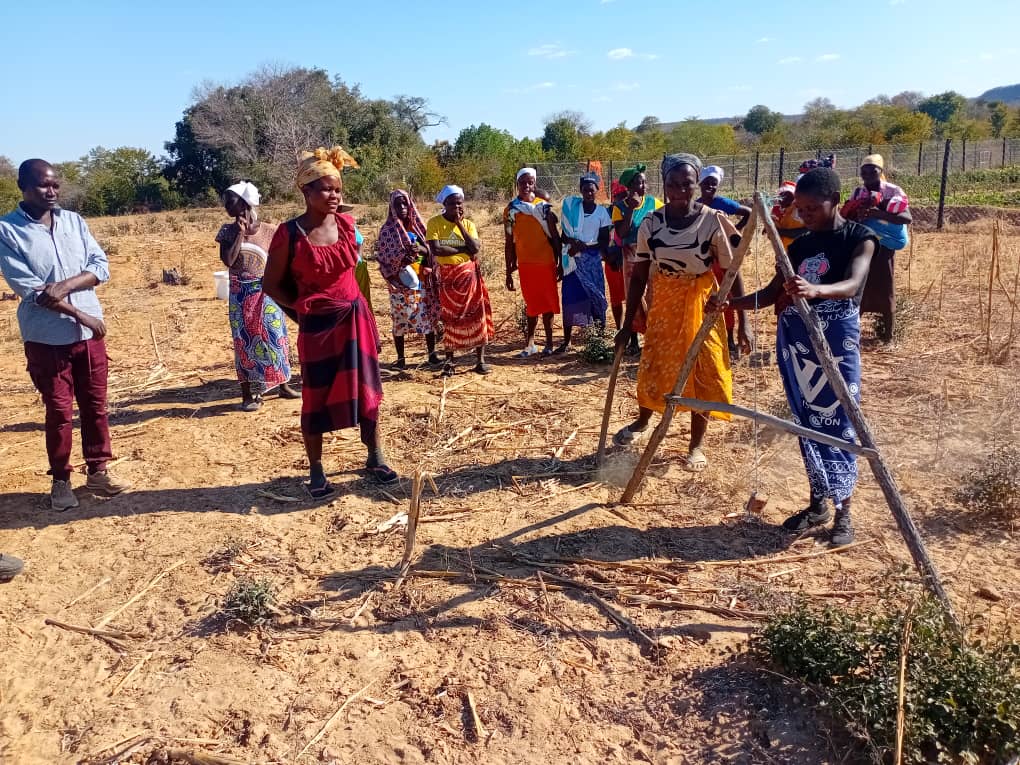For generations, communities in rural Kariba have battled the harsh realities of poverty, relentless drought, and land degradation. Erratic rainfall and prolonged dry spells, exacerbated by a changing climate, often led to failed harvests, widespread hunger, and a cycle of deforestation as desperate farmers cleared new land for subsistence.
Nutrition Action Zimbabwe (NAZ) and its partners are empowering farmers on sustainable, eco-friendly agricultural practiced under the Reversing Environmental Degradation in Africa and Asia (REDAA) funded ‘Community-led Adaptation of Farming with Alternative pollinators’ project.
Recently, NAZ field officers and ward-based Agritex officers conducted practical training sessions for Ward 6 and 8 project farmers (78 females; 30males) on sustainable agricultural practices, including contour ridge construction using A-frames. The training, attended by farmers and village heads from project clusters, aimed to enhance their capacity to manage natural resources effectively, reduce land degradation, and improve livelihoods.
“Before we learned about A-Frames, farming here in Chilimba felt like a constant battle against the land. Our community garden is on a slope, and every time it rained, our topsoil would wash away. The water would rush down, taking with it all our hard work, and leaving our crops struggling,” Barbra Gayungwa said, one of the farmers at Chilimba community garden.
“Then came the training. I was skeptical at first. How could two simple wooden sticks tied together make a difference? But the trainers showed us how to use the A-Frame to find the exact contour lines of our land to build the small mounds to hold back the water. It was such a simple tool, but it felt like a key that unlocked a new way of farming for us.”
Through adopting contour ridging, farmers can reduce soil erosion, increase water infiltration, and promote soil health. This sustainable practice aligns with the REDAA-funded project’s goal of reversing environmental degradation and promoting ecosystem-based adaptation.
“The use of A-frames, made from locally available materials, ensures the sustainability and scalability of this practice. Farmers can easily replicate this technique in their own fields, reducing reliance on external inputs and enhancing their resilience to climate change,” said Ernest Chipamba, Agritex officer.
The participation of village heads and representatives from surrounding villages demonstrates the project’s commitment to community-led development and collaboration.
“The training was eye-opening, and I realized how much soil I was losing due to erosion. With A-frames, I can now construct contour ridges that will help reduce soil erosion and increase water infiltration. This will definitely improve my crop yields and help me adapt to climate change,” Tinashe Nyikadzino, Ward 8 farmer.
Through the REDAA-funded Community-Led Adaptation of Farming with Alternative Pollinators project, NAZ, ACF, PORET and MyTrees are working towards a future where communities thrive in harmony with their environment. These training sessions mark another step towards achieving this vision.

